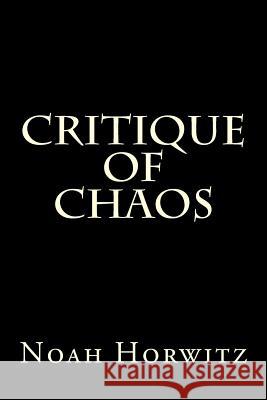Critique of Chaos: Pancomputational Realism and the De-encryption of the Names » książka
Critique of Chaos: Pancomputational Realism and the De-encryption of the Names
ISBN-13: 9781496091345 / Angielski / Miękka / 2014 / 184 str.
Critique of Chaos is a conceptual polemic aimed at those the text dubs 'ontological anarchists'-today's advocates of metaphysical chaos and confusion, of chance and indeterminacy. In place of a philosophy of disorder, a pancomputational realist interpretation of existence is proposed and defended. This realist vision is marshaled against the computational anti-realism of philosophers like John Searle and Hilary Putnam. Such a pancomputationalist theory relies in particular on the most fundamental insight of Stephen Wolfram's ongoing research into the nature of computing-that rules themselves give rise to intrinsic randomness. In this way, a Pythagorean view of existence is articulated to delimit the true meaning of randomness and the concepts put forth in the name of 'complexity theory' (the butterfly effect, attractors, fractals, etc.) and Quantum Mechanics in particular. The significance of entropy and the fundamental role of incomputability are explored. The manner in which the basic programs of reality are encrypted is outlined along with the possibility of deciphering those fundamental names. In the end, the ultimate future of the computation of the universe is explored via an engagement with John Smart's 'transcension hypothesis'. Table of Contents 1. Introduction: A Critique of Chaos 2. Pythagorean Preliminaries 3. Against Materialism 4. The Anti-Realist Interpretation of Computation: A Rejection 5. Programming 'Constraints' 6. Not Fractal 7. The Meaning of Attractors 8. Randomness 9. The Significance of Entropy 10. The Truth of Pseudo-Randomness 11. An Interpretation of Quantum Mechanics 12. The So-Called 'Butterfly Effect' 13. The De-Encryption of the Names 14. Incomputables: On 'Speculative Computation' 15. The Importance of the Planck Level 16. Autoevolution: The Convergence and Homology of Code 17. The Big Break 18. The Transcension Hypothesis"
Zawartość książki może nie spełniać oczekiwań – reklamacje nie obejmują treści, która mogła nie być redakcyjnie ani merytorycznie opracowana.











